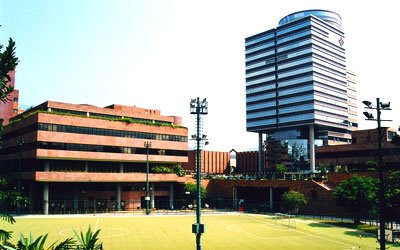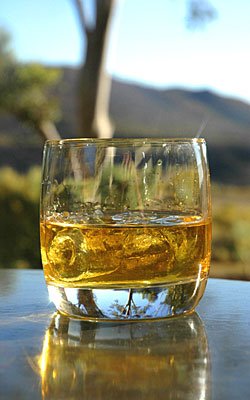Extreme Cancer Fighters!
:: A new drug has been developed that can prolong the life of liver cancer patients by several months.
++ Bio Tech: Hong Kong / Adrew Young / Hong Kong Polytechnic University

The Hong Kong Polytechnic University (PolyU) has won one Special Gold and Gold Award in the 33rd International Exhibition of Inventions, New Techniques and Products, which was held earlier on in Geneva. This award was for their novel method in the treatment of liver cancer. This is the first drug developed in Hong Kong that has been able to come to the stage of clinical trial. It is regarded as a cornerstone in the development of bio-technology.The new drug, called "BCT-100, developed by scientists Thomas Leung, Thomas Lo, and Paul Cheng, is showing promise as an alternative to chemotherapy (without the nasty side effects). Instead of killing off the cancer cells, it starves them and buys precious time for patients, while at the same time giving them a better quality of life.
Note From Technophile: Human trials have recently began on the drug, which is made of an edible bacterium called Baccilus subtillis. The bacterium creates a natural chemical that destroys cancer-causing arginine proteins. This new drug is considered to be a first step in finding a more permanent cure for liver cancer, which kills some 1,400 people in Hong Kong each year.:: Source: [The Hong Kong Polytechnic University (PolyU)]
:: Innovation: First step in finding a permanent cure for liver cancer!
:: Available: Soon.
:: Cost: $8 million.
"My cancer scare changed my life. I'm grateful for every new, healthy day I have. It has helped me prioritize my life." ~Olivia Newton-John:: Crushed Pineapple stems can fight cancer by blocking the growth of breast, lung, colon, ovarian, and melanoma tumor cells!
++ Bio Tech: Australia / Tracey Mynot / Queensland Institute of Medical Research
Australian scientists have discovered pineapple molecules can act as powerful anticancer agents, and could lead to a new class of cancer-fighting drugs.
 Scientists at the Queensland Institute of Medical Research said their work centered on two molecules from bromelaine, an extract derived from crushed pineapple stems that is used to tenderize meat, clarify beers, and tan hides. One of the molecules (CCZ) stimulates the body's immune system to target and kill cancer cells. The other (CCS) blocks a protein called Ras, which is defective in 30 percent of all cancers.
Scientists at the Queensland Institute of Medical Research said their work centered on two molecules from bromelaine, an extract derived from crushed pineapple stems that is used to tenderize meat, clarify beers, and tan hides. One of the molecules (CCZ) stimulates the body's immune system to target and kill cancer cells. The other (CCS) blocks a protein called Ras, which is defective in 30 percent of all cancers."In searching for these components, we discovered the CCS and CCZ proteins and found that they could block growth of a broad range of tumor cells, including breast, lung, colon, ovarian, and melanoma," Mynott said. While clinical trials are a long way off, Mynott said the research had huge potential. "The way CCS and CCZ work is different to any other drug in clinical use today," she said. "Therefore, CCS and CCZ will represent a totally new way of treating disease and potentially a whole new class of anticancer agent."
Note From Technophile: The institute has launched a two-year study to examine the safety of the treatment and means of securing a reliable source of CCS and CCZ. If it succeeds it will seek a commercial partner to develop a drug that could be used in human clinical trials.:: Source: [Queensland Institute of Medical Research]
:: Image Credit: Diane Groves, Honolulu, Hawaii, USA (thanks, Diane, for your excellent photo of a "baby" pineapple).
:: Innovation: Developing a whole new class of anticancer agent.
:: Available: Unknown.
:: Cost: Millions.
"She's going to be fine. She's really lucky her cancer has been treatable. She's getting better by the day. I can't wait to see her back on her feet. She's inspirational, she's a fighter." ~Dannii Minoque (Australian Actress):: Single-malt whisky can protect against cancer!
++ Bio Tech: London / Dr. Jim Swan / Charlene Nuble
 Dr. Jim Swan, an independent consultant to the global drinks industry, said that, according to research, single-malt whisky contains "more ellagic acid than red wine."
Dr. Jim Swan, an independent consultant to the global drinks industry, said that, according to research, single-malt whisky contains "more ellagic acid than red wine."He said that ellagic acid is an effective "free-radical scavenger" that "absorbs" or "eats up" rogue cells that occur in the body during eating.
"The free radicals can break down the DNA structure of our existing cells, which then leads to the risk of the body making replacement rogue cancer cells," he said.
"So, whether you indulge in the odd tipple, or you are a serious connoisseur, whisky can protect you from cancer--and science proves it."
Note From Technophile: Lesley Walker of Cancer Research UK finds the claim dubious. "There is considerable data documenting the link between drinking excess alcohol and the increased risk of a number of cancers, particularly in smokers," she said. "Ellagic acid is a powerful antioxidant, but that does not mean it is necessary to hit the bottle," she said, noting that the ellagic acid can also be found in soft fruits.:: Source: [Charlene Nuble]
:: Image Credit: Dominic Morel, Knysna, Western Cape, South Africa
:: A combination treatment that can double the survival rates for pancreatic cancer, a disease that has very high mortality rate.
++ Bio Tech: Milan, Italy / Michele Reni / San Raffaele H. Scientific Institute
Many patients with pancreatic cancer die within a few months of diagnosis because their condition is already far advanced by the time it is spotted. The standard treatment is a single chemotherapy drug, gemcitabine (Gemzar), which interferes with the growth of cancer cells. However, the survival rate is not good. Only 17 to 28 percent of diagnosed patients using gemcitabine survive beyond a year.
 Italian researchers recruited 99 volunteers with pancreatic cancer and assigned gemcitabine-only treatment to 47 of them, while the other 52 were given gemcitabine in combination with other chemotherapy drugs: Cisplatin (Platinol), Epirubicin (Ellence), and Flourouracil (Adrucil). After a year, about 40 percent of the group on the combination treatment had survived, twice that of the gemcitabine-only group.
Italian researchers recruited 99 volunteers with pancreatic cancer and assigned gemcitabine-only treatment to 47 of them, while the other 52 were given gemcitabine in combination with other chemotherapy drugs: Cisplatin (Platinol), Epirubicin (Ellence), and Flourouracil (Adrucil). After a year, about 40 percent of the group on the combination treatment had survived, twice that of the gemcitabine-only group.Note From Technophile: The study was led by Michele Reni, an oncologist at the San Raffaele H. Scientific Institute in Milan, who suggests that a wider trial be carried out before the combination treatment is enshrined as the new standard.:: Source: [San Raffaele H. Scientific Institute]
:: Innovation: Using combination therapy to double the survival rate of cancer patients.
:: Treatment switch almost doubles the chances that breast cancer will not reoccur.
++ Bio Tech: Vienna, Austria / Raimund Jakesz / Vienna Medical University
 Women diagnosed with early breast cancer who are on the mainstream drug tamoxifen can greatly improve their chance of avoiding a recurrence of the disease if they switch treatment after two years.
Women diagnosed with early breast cancer who are on the mainstream drug tamoxifen can greatly improve their chance of avoiding a recurrence of the disease if they switch treatment after two years.Austrian and German doctors looked at data from two big trials in which patients were randomly assigned just tamoxifen for their postsurgery drug, or were switched to anastrozole, an aromatase inhibitor, after two years on tamoxifen.
At a follow-up five years after surgery, women who made the switch to anastrozole were 40 percent less likely to have a recurrence of breast cancer.
Of the 1,606 women in the tamoxifen-only group, there had been 110 cases of recurrence by the five-year mark.
Among the 1,618 in tamoxifen-then-anastrozole group, there were 67 cases of recurrence.
Note From Technophile: The study was headed by Raimund Jakesz, a professor at Vienna Medical University.:: Source: [Vienna Medical University]
:: Image Credit: Marek Bernat, Wroclaw, Dolnoslaskie, Poland.




















0 Comments:
Post a Comment
<< Home